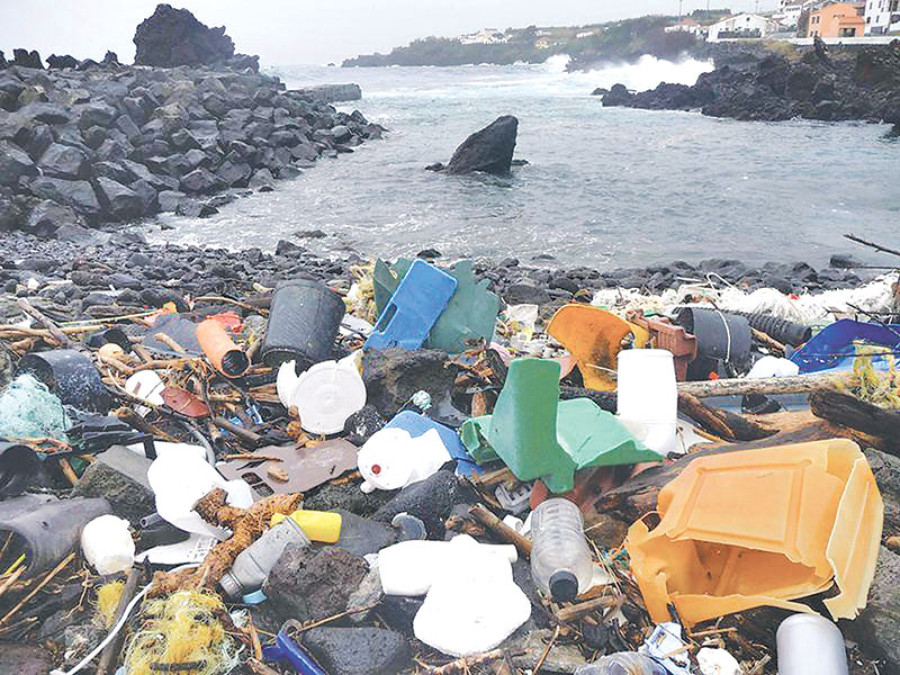Opinion
Make the switch
Our love affair with plastics is toxic and its time we get rid of it
Sramika Rijal
This year, World Environment Day, emphasised on managing wastes with the slogan: Beat Plastic pollution: If you cannot reuse it, refuse it. With the rapid increase in population in the world, there is an increased trend in the use of plastic. Data shows that globally 500 trillion plastic bags are being used annually. Because of its convenience in goods packaging, versatility and low cost, we use plastic extensively in our daily lives. Research shows that there will be more plastic in the oceans than fishes by 2050 if similar trend continues. People are highly dependent on plastic as they ask for a polythene bag for any stuff they buy in market. That may be either while buying a packet of noodles, bread or biscuit, a packet of sanitary napkin or even some pieces of chocolates. Not only polythene, other plastic products like kitchen utensils, clothes, decorating items are made of plastic making it an almost indispensable part of today’s world.
No doubt, more consumption leads to more challenge in proper disposal and management along with the risk associated with human health. Research lately showed that tiny plastic particles— microplastics have not just polluted the ocean, they have infested the world’s drinking water too. A research undertaken at Minnesota School of public health showed that tap water is being contaminated with microplastics fibres everywhere, from New York to New Delhi. Microplastics is the most prevalent type of matine debris found in our oceans. It also absorbs toxic chemicals that cause cancer and other illnesses. These chemicals release when consumed by aquatic animals, ultimately causing the biomagnification effect—an effect occurs when there is increased toxic chemical in the food chain. However, no research has been undertaken yet pertaining to it in Nepal.
Waste disposal has trans-boundary effects and we don’t know how many of us are already in greater risk in terms of consuming plastic particles. According to a research done by Asian Development Bank (ADB) in 2012, plastic contributed to 12 percent of waste generation—becoming second only to waste being generated by dumping. On the one hand, burning of plastics emits noxious greenhouse gases responsible for global warming and climate change while on the other, excess plastic load in water bodies threatens marine and human life. It also clogs drains that could result in deluges. All this creates irreversible impact on ecological communities hindering ecosystem services along with causing a slew of problems, each step along the food chain.
Waste disposal
Uncomely and unscientific ways of plastic disposal is still prevailent in Nepal. A disposable plastic can take up to 100 to 500 years to disintegrate but waste management in Nepal is at its worst condition. While the developed countries has made remarkable improvements in managing waste through innovation technologies along with efficient recycling units, biodegradable bags, waste to energy system; sanitary landfill sites seems only in operation in Nepal.
Landfills are not sustainable as it emits by-products like methane, dioxin which are noxious gases and the leachate from landfill when left untreated can reach into the soil, contaminating water sources, plants and food. Despite the urgency of adoption of improved system in waste management sector, recently allocated budget for the fiscal year 2017/18 seems to have overlooked the issue. Some ongoing works in Nepal like banning of plastics in some cities and supermarkets, bio gas from organic waste are not enough if we want to achieve sustainable development goals. Sustainable development is impossible until and unless there is a paradigm shift towards green society for which investments and innovations coupled with public private partnership plays crucial role.
To beat plastic pollution, skilled manpower who can bring innovation in reusing and recycling plastic products should be mobilised in different parts of country through workshops and trainings. This will not only control pollution but will also create scope for income generation among rural people. Simple things like reusing our plastic bottles and cups, carrying your own bag to the shopping centre, avoiding use of straws at restaurants are some of the basic changes we can implement in our lives to curb this issue. Plastics made our lives easier but now we are drowning in it. Our love affair with plastic is toxic and that needs to change before it causes us more harm than it already has.
Rijal is an Assistant Professor at Agriculture and Forestry University, Rampur, Chitwan




 18.12°C Kathmandu
18.12°C Kathmandu










